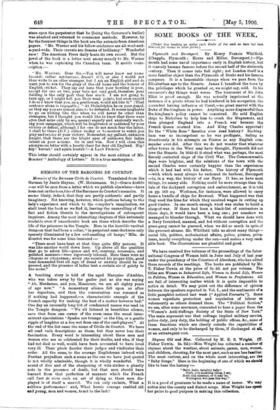SOME BOOKS OF THE WEEK.
(Under this heading we notice such Books of the week as have not been resen.ed for review in other forms.) Plymouth and Devonport. By Henry Francis Whitfield. (Chapple, Plymouth ; Horns and Miller, Devonport.) —Ply- mouth had some naval importance early in English history, but it scarcely became famous before the second half of the sixteenth century. Then it comes into full sight ; not London itself is a more familiar object than the Plymouth of Drake and MB famous compeers. It is a lamentable change when we pass from the Elizabethan age to the Stuarts. James I. benefited the town by the privileges which he granted or, we might say, sold. In his successor's day things went worse. The treatment of Sir John Eliot is proof enough. He was actually imprisoned at tbe instance of a pirate whom he had hindered in his occupation, the scoundrel having influence at Court,—no great marvel with the Duke of Buckingham in power. Anything more disgraceful than Buckingham's policy cannot be conceived. He sold English ships to Richelieu to help him to crush the Huguenots, and then plunged England into a French war because the French Queen scorned him. And King Charles approved! Do the "White Rose" fanatics ever read history ? Bucking- ham was as incompetent as he was profligate, failing as disastrously in his attempts on France as any English com- mander ever did. After this we do not wonder that whatever other towns in the West may have thought, Plymouth did not love the Stuarts. In 1643-45 it stood what was, perhaps, the most fiercely contested siege of the Civil War. The Commonwealth days were brighter, and the relations of the town with the second Charles were certainly happier than the experiences which it had had with his father. The history of Plymouth —with which must always be reckoned its harbour, Devonport —is, in a way, the history of our Navy. It has, as have most things, its seamy side. Nothing could be more strange than the tale of the dockyard corruption and embezzlement, as it is told on pp. 260 seq. Workmen, for instance, were allowed to carry home a bundle of chips for firewood. What happened was that they used the time for which they received wages in cutting up good timber. In one month enough wood was stolen to build a sloop-of-war. If there had been a black-list of contractors in those days, it would have been a long one ; yet somehow we managed to blunder through. What we should have done with a Navy furnished, manned, and fed without corruption and the press-gang cannot be guessed, when we did so much in spite of the grossest abuses. Mr. Whitfield tells us about many things— social life, politics, ecclesiastical affairs, police, pirates, priva- teers, nearly everything under the sun—and makes a very read- able book. The illustrations are plentiful and good.






































 Previous page
Previous page